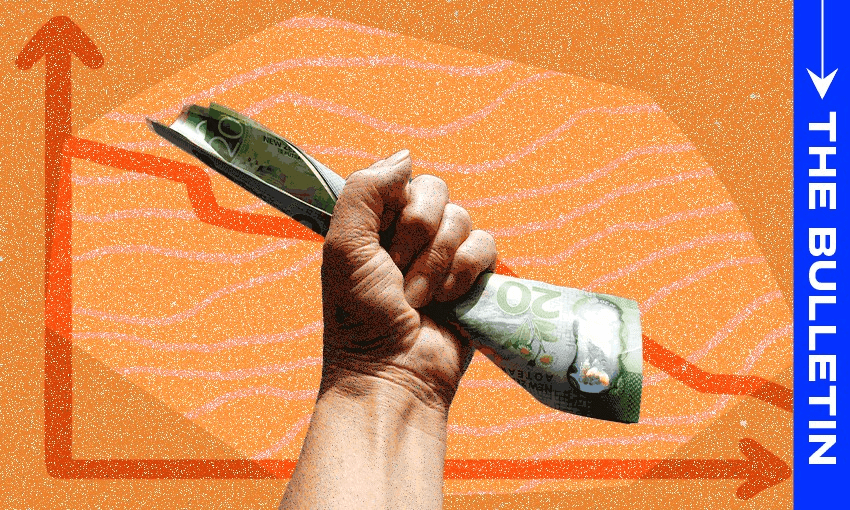The state of the economy will be laid bare later this morning, and it might not be good news, writes Stewart Sowman-Lund in today’s extract from The Bulletin.
To receive The Bulletin in your inbox every weekday morning, sign up here.
Opening the books
The state of the economy will be laid bare later this morning with the release of the most recent GDP figures for the three months to June. After a slight pick up in the last quarter pulled us out of recession, today’s numbers are predicted to be less rosy, explained The Post’s Tom Pullar-Strecker. The Reserve Bank picked the economy would shrink by 0.5% after last quarter’s 0.2% growth, while the main banks are also generally predicting a drop of anywhere from 0.1% to 0.4%. Any shrinkage would suggest we’re back in recession, though we would need to wait for the next round of data to be sure of this given two consecutive declines are the indicator for recession.
Nevertheless, recession or not, things remain fairly static and it could be a while before that general “mood” changes. New Zealand’s current account deficit increased unexpectedly to $7.2 billion in the three months to the end of June, figures released yesterday revealed. And economists are painting a fairly grim picture of the months ahead and the “rolling maul” recession, reported the Herald’s Liam Dann (paywalled).
Get ready for ‘Super Thursday’
We’ll also get a better picture of how rest of the world is faring today, which is partly why Kiwibank has dubbed it “Super Thursday”. First up, the US Federal Reserve, the world’s most influential central bank, has just delivered its first cut in four years. The last time was in the early days of the Covid pandemic, explained CNBC. The Fed has opted for a “jumbo cut” of 50 basis points, which was widely picked, signalling that inflation is heading in the right direction.
The Fed decision will be widely watched by economists here and around the world. Speaking to Newstalk ZB’s Ryan Bridge earlier this morning, BNZ’s chief economist Mike Jones said the move could be “very influential” for interest rates globally and could put a “little more pressure” on our own Reserve Bank to continue down the same path. There are two cash rate reviews left for this year, on October 9 and November 27.
Meanwhile, “Super Thursday” will wrap with new Australian jobs data and be followed shortly after by policy decisions from both the Bank of England and Bank of Japan.
A third mill closes
Back at home, the unsettled economic environment can be held partly responsible for the closure of yet another mill. The Oji Fibre Solutions mill in the Auckland suburb of Penrose will close permanently, reported RNZ, with as many as 75 jobs to go. It comes soon after hundreds of workers were let go at the two Winstone Pulp mills in Ruapehu with 230 people out of a job. “We see no prospect of the situation improving, and we cannot continue the way we are now,” staff at Oji Fibre Solutions were told.
High energy prices and rising labour costs are partly to blame, but prime minister Christopher Luxon told reporters that “economic mismanagement” by the former government was the cause. “Unemployment is on the rise as firms are having to lay workers off after having dealt with the recession, high interest rates and high inflation,” he said.
Survive to ‘25?
Despite interest rates being cut and the cost of living crisis easing, things still feel murky. In some ways, whether or not the figures today do indeed point to a triple-dip recession doesn’t actually matter – it’s tough out there. “Officially we may record three dips. But for households and businesses, it has been two years of unrelenting recession,” argued Kiwibank’s economists. But GDP dip or not, the longer term outlook remains more positive. Asked by Corin Dann on RNZ’s Morning Report whether the so-called mantra of “survive to 2025” should really be “survive through 2025”, Kiwibank chief economist Jarod Kerr signalled things were going to get better – but it wouldn’t be overnight.
Writing for Interest, David Hargreaves said the big thing to watch out for today will be whether we’ve reached the bottom of the cycle. “Maybe we can draw some positives and encouragement that the future is now looking ‘less bad’,” he wrote. “But less bad doesn’t immediately become good.” After today, all eyes will be fixed on the next official cash rate decision and whether businesses take encouragement from lower interest rates, especially given confidence soared in the wake of the last cut.
